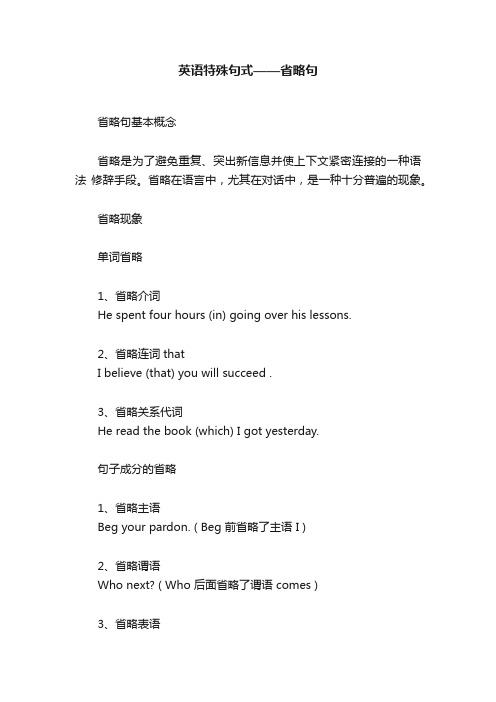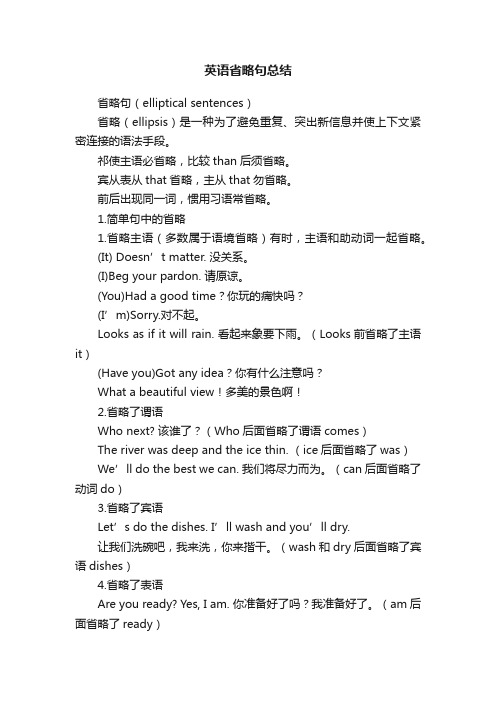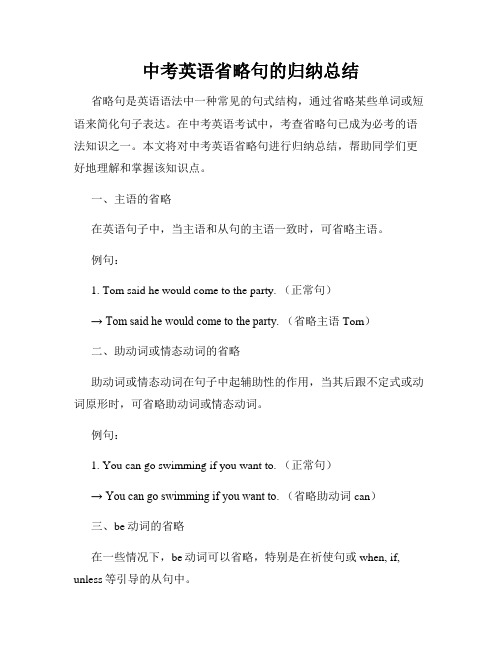英语语法省略句
英语特殊句式——省略句

英语特殊句式——省略句省略句基本概念省略是为了避免重复、突出新信息并使上下文紧密连接的一种语法修辞手段。
省略在语言中,尤其在对话中,是一种十分普遍的现象。
省略现象单词省略1、省略介词He spent four hours (in) going over his lessons.2、省略连词thatI believe (that) you will succeed .3、省略关系代词He read the book (which) I got yesterday.句子成分的省略1、省略主语Beg your pardon. ( Beg 前省略了主语 I )2、省略谓语Who next? ( Who 后面省略了谓语 comes )3、省略表语Are you ready? Yes, I am. ( am 后面省略了 ready )4、省略宾语Let ' s do the dishes. I ' ll wash and you ' ll dry. ( wash 和 dry 后面省略了宾语 dishes )5、省略定语He spent part of the money, and the rest he saved. ( the rest 后面省略了定语 of the money )6、省略状语He was not hurt. Strange! ( Strange 前面省略了状语 how )不同句式中的省略1.简单句中的省略:在对话中,交谈双方都知道谈论的对象,则可以省略句子的主语,省略主语和谓语的现象在交际用语中出现的很多。
Sounds like a good idea.2.并列句中的省略:在并列句中,相同的成分如主语,谓语,宾语等都可以省略。
They learn French and we English.3.复合句中的省略:定语从句:That’s the reason he is late for the conference.状语从句:(1)时间状语从句中,省略“主语+be”:When (she was) very young,she began to learn to play the violin.(2)条件状语从句中,省略“主语+be”:If (he is) given more time, he will do the work better.(3)让步状语从句中,省略“主语+be”:Though (he is) a young man, he has made several inventions. (4)方式状语从句中,省略“主语+be”:She talked to the stranger as if (she were) absent-minded.(5)比较状语从句省略相关成分:由than或as引导的比较状语从句,在意义明确的情况下,可以省略than或as后面的相应部分,这一点与上述情况不同。
高考英语语法知识点归纳总结:省略句

④Child as he is, he knows a lot.
虽然他还是一个孩子,却懂得很多
介词的省略
①both后常跟of短语,其后可以接名词复数形式,也可以接代词宾格复数形式。接复数名词时,介词of可以省略,但接代词宾格时,of不能省略。
②在现在完成时表持续和重复的句型中,一段时间前的介词for可以省略。
这双鞋穿破了,已经穿了很长一段时间了。
③Trees can prevent the earth (from) being washed away.
树能阻止泥土被冲走。
Can you stop him (from) going swimming in the river?
你能阻止他下河洗澡吗?
I have some difficulty (in) answering the question.
约翰一定在踢球,而玛丽一定在做作业。
②His suggestions made John happy, but (his suggestions made) Mary angry.
他的建议使约翰高兴,却使玛丽很生气。
③Old McDonald gave up smoking for a while, but (he) soon returned to his old ways.
有些动词,tell, ask, allow, expect, force, invite, permit, persuade, order, warn, wish, would like,forbid等后跟动词不定式作宾语补足语、主语补足语时,不定式承前省略动词原形,保留动词不定式符号to。
He didn't come, though we had invited him to (come).
英语省略句总结

英语省略句总结省略句(elliptical sentences)省略(ellipsis)是一种为了避免重复、突出新信息并使上下文紧密连接的语法手段。
祁使主语必省略,比较than后须省略。
宾从表从that省略,主从that勿省略。
前后出现同一词,惯用习语常省略。
1.简单句中的省略1.省略主语(多数属于语境省略)有时,主语和助动词一起省略。
(It) Doesn’t matter. 没关系。
(I)Beg your pardon. 请原谅。
(You)Had a good time?你玩的痛快吗?(I’m)Sorry.对不起。
Looks as if it will rain. 看起来象要下雨。
(Looks前省略了主语it)(Have you)Got any idea?你有什么注意吗?What a beautiful view!多美的景色啊!2.省略了谓语Who next? 该谁了?(Who后面省略了谓语comes)The river was deep and the ice thin. (ice后面省略了was)We’ll do the best we can. 我们将尽力而为。
(can后面省略了动词do)3.省略了宾语Let’s do the dishes. I’ll wash and you’ll dry.让我们洗碗吧,我来洗,你来揩干。
(wash和dry后面省略了宾语dishes)4.省略了表语Are you ready? Yes, I am. 你准备好了吗?我准备好了。
(am后面省略了ready)He was a lover of sports as he had been in his youth.他还是象年轻时那样,是一位运动爱好者。
(had been后面省略了a lover of sports)5.省略了状语He was not hurt. Strange! 他没有受伤,真奇怪!(Strange前面省略了状语how)6.同时省掉句子几个成份。
中考英语省略句的归纳总结

中考英语省略句的归纳总结省略句是英语语法中一种常见的句式结构,通过省略某些单词或短语来简化句子表达。
在中考英语考试中,考查省略句已成为必考的语法知识之一。
本文将对中考英语省略句进行归纳总结,帮助同学们更好地理解和掌握该知识点。
一、主语的省略在英语句子中,当主语和从句的主语一致时,可省略主语。
例句:1. Tom said he would come to the party. (正常句)→ Tom said he would come to the party. (省略主语Tom)二、助动词或情态动词的省略助动词或情态动词在句子中起辅助性的作用,当其后跟不定式或动词原形时,可省略助动词或情态动词。
例句:1. You can go swimming if you want to. (正常句)→ You can go swimming if you want to. (省略助动词can)三、be动词的省略在一些情况下,be动词可以省略,特别是在祈使句或when, if, unless等引导的从句中。
例句:1. Be quiet and listen to the teacher. (正常句)→ Be quiet and listen to the teacher. (省略be动词)四、状语的省略当主句和从句之间的时间状语、地点状语、方式状语等相同或相似时,可将其在从句中省略。
例句:1. He lives in Beijing and I live in Beijing. (正常句)→ He lives in Beijing and I do too. (省略相同的地点状语in Beijing)五、连接词的省略在句子中,连接词如and, but, or等可以省略,特别是在并列句中。
例句:1. She is tall and she is thin. (正常句)→ She is tall and thin. (省略连接词and)六、祈使句中的省略在祈使句(祈使句用于表达命令、请求、劝告等)中,主语you可以省略。
英语语法省略句

省略句1)不定式在love, mean, want, like, wish, expect, try, intend, plan, refuse, prefer, seem等动词后面2)在happy,glad,eager,ready,willing等形容词后面。
1.---will you join us?--- I should love to(join you).2.I asked him to see the fil m, but he didn’t want to(see the film).3.--- Would you like to go with us?--- Yes, I’m glad to(go with you)4.He doesn’t get up early as he used to. (get up)注意: 如果不定式中含有be, have(助动词), have been, 通常保留be, have(助动词), have been.1.--- Are you a sailor?--- No, but I used to be.2.---He hasn’t finished yet.---well, he ought to have.1. —I'll be away on a business trip. Would you mind looking after my cat?—Not at all, ________ . (NMET 1995)A. I have no timeB. I'd rather notC. I‘d like itD. I'd be happy to2. —Does your brother intend to study German?—Yes, he intends ________ . (NMET 1998上海卷)A. /B. toC. soD. that5.--- He hasn’t gone to the office up to now.--- Well, he _____.A. shouldB. ought toC. ought to goD. ought to have4. —You should have thanked her before you left.—I meant ________ , but when I was leaving I couldn't find her anywhere. (NMET 2000北京春招卷)A. to doB. toC. doingD. doing to替代词so / not用于避免重复前面所说过的内容。
高中英语语法——省略句(26张PPT)

please.
的一部分)
A: Would you like to
come to the party? B: I’d love to (come the
party).
不定式后 省略动词
They do not visit their parents
as much as they ought to (visit
பைடு நூலகம்
— Well, her parents wouldn’t allow
her to go to the party, but she
still _____.
A. hopes to
B. hopes so
C. hopes not
D. hopes for
(江苏2017)
4. — Have you got any particular
You can borrow my first aid notes if you want to (borrow my first aid notes).
不定式后省略动词
7) Sounds like a good idea. (It) sounds like a good idea.
8) Anything I can do for you? (Is there) anything I can do for you?
5. Sorry to hear that. I’m sorry to hear that.
6. Pity you couldn’t come.
It’s/ What a pity you couldn’t come. 7. This way, please.
Step this way, please.
高中英语语法-省略句
: Unlesshhee is invited, he won’t come.
: Unlesshe is invited, he won’t come. : Whilehhee is doing house work, my father often listens to music. : While he is doing house work, my father often listens to music.
2、省略主谓或主谓语的一部分。如:
(省略主语和谓语)
: What/How (do you think) about a cup of tea ? : Why (do you) not say hello to him ?
3、省略表语。
: –Are you thirsty? – Yes, I am(.thirsty). : His brother isn’t lazy, nor is his sister(.lazy).
※介词的省略※(考点)
1. 一些常和动名词、形容词一起搭配的介词常省 略,而保留其后的 动名词,常见的句型有
spend/waste time (in) doing, lose no time (in) doing; have difficult/trouble (in) doing; be busy (in) doing; stop/prevent sb. (from) doing 等。
: The order that we(sshhoouuldld) stay where we are is very serious and severe.
: It’s very important that students(shshoouuldld) study hard at school.
完整版高中英语语法省略句
3介词but前若有动词do,后面的不定式不带to。-The boy did nothing but pla .-4主语从句中有动词do,后面作表语的不定式的to可带可-不带。-All we can do now i towait.-也●●00●。鲁◆-●●●●意语参带0
【高考链接】-1.20l4福建高考The climate here is quite pleasant,. he-temperature rarely,-reaching 30 Cin summer.-A.if n t-B.if ever-C.if any-D.if so-解析】选B。三-考查状语从句的省略。句意:这儿气 宜人,-如果曾经有过(高温)的话,夏天温度也很少达到30摄氏度。f-ever意为"如果曾经有过或即使有过的 ”,其作用是缓和-语气。if not如果不是这样的话;if any如果有一些的话;ifso-如果是这样的话
3.在对话或并列句中,如果主语、谓语不同,而宾语相同,-则常省去相同的宾语部分。-Tom enjoys d ncing,but Peter hates dancing-0●●09●00套-●色●●意语参●0
4.省略作宾语的不定式短语,只保留0,但如果该宾语是-动词be或完成时态,则须在之后加上be或have。Are you going there?--Yes,I'd like to go there.-注意:在下 词后常省略不定式但要保留to:want,wish,-like,hate,hope,intend,plan, ove,refuse,expect,-want和ike用于从句中时,to常常省略。-●●0●●●●-●●● 培
复合句中的省略-1.复合句中的省略现象常见于从句中,主句中的省略通常出-现在句首。-Hope you wi l have a good journey.-2.有时整个主句都可省略,这种省略通常出现在简短答语-中。Are you going to buy the house?--Unless my wife ob.je ts.-位●●●●培●●0
英语语法 省略句在句子中的作用是什么
英语语法省略句在句子中的作用是什么省略句是指在句子中省略了某个成分,但读者或听者可以根据上下文推断出被省略的内容。
省略句在英语语法中起到简化句子结构、提高语言流畅度和避免重复的作用。
1. 简化句子结构:省略句可以简化句子结构,使句子更加简洁明了。
通过省略一些可推断的成分,可以避免冗余和重复,使句子更简洁、更易理解。
例如:- She can play the piano, and he can too.(她会弹钢琴,他也会。
)- She can play the piano, and he can as well.(她会弹钢琴,他也会。
)2. 提高语言流畅度:省略句可以提高语言的流畅度,使句子更自然、更流畅。
通过省略一些常见的成分,可以避免冗长和啰嗦,使句子更加简洁有力,增加语言的节奏感。
例如:- I like coffee, and she does too.(我喜欢咖啡,她也喜欢。
)- I like coffee, and she likes it as well.(我喜欢咖啡,她也喜欢。
)3. 避免重复:省略句可以避免重复使用相同的词语或短语,使句子更加清晰、更加连贯。
通过省略一些可推断的信息,可以避免重复表达相同的意思,提高句子的表达效果。
例如:- John bought a new car, and Mary bought one too.(约翰买了一辆新车,玛丽也买了一辆。
)- John bought a new car, and Mary bought a new car as well.(约翰买了一辆新车,玛丽也买了一辆。
)虽然省略句可以使句子更加简洁、流畅和连贯,但在使用省略句时需要注意以下几点:1. 上下文的清晰性:省略句需要依赖上下文来推断被省略的内容,因此上下文的清晰性对于理解省略句至关重要。
如果上下文不清晰或含糊不清,可能会导致误解或理解困难。
2. 受限于语境:省略句的使用受限于特定的语境和语言环境。
【英语知识点】英语省略句语法总结及例句
【英语知识点】英语省略句语法总结及例句英语中的省略是为了避免重复、突出新信息并使上下文紧密连接的一种语法修辞手段。
省略在英语语言中,尤其在对话中,是一种十分普遍的现象。
省略句是英语的一种习惯用法。
1.省略介词:I've studied English (for) five years.我已学五年英语了。
2.省略连词that:I believe (that) you will succeed.我相信你们会成功的。
3.省略关系代词:I'll give you all (that) I have.我要把我所有的一切都给你。
1.省略主语:(You) Open the door,please.请开一下门。
2.省略谓语:Who (es) next?该谁了?3.省略主谓语或主谓语的一部分:(There is) No smoking.禁止抽烟。
4.省略表语:Are you thirsty ? 你30岁了吗?Yes,I am (thirsty).是的,我是。
5.省略宾语:Let's do the dishes. I'll wash and you'll dry(dishes). 让我们洗碗吧,我来洗,你来揩干。
6.省略状语:He was not hurt. (how)Strange! 他没有受伤,真奇怪!7.同时省略几个成分:(I wish) Good luck (to you) .祝你好运/祝你顺利。
1.为避免重复而进行的省略。
当一个句子中有两个或更多相同的词、短语出现时,其中的第一个须保留,其余的往往省略,以达到避免重复、使句子简练的目的。
高考中尤其要注意的情况是:当时间状语从句、地点状语从句、方式状语从句、让步状语从句、条件状语从句等状语从句中的主语与主句的主语一致并含有be时,往往将该状语从句中的主语和be一同省略。
2.语法上的省略。
有些成分的省略是出于语法上的原因——使表述更为简明,例如:He got up at six (o’clock).他六点钟起床。
- 1、下载文档前请自行甄别文档内容的完整性,平台不提供额外的编辑、内容补充、找答案等附加服务。
- 2、"仅部分预览"的文档,不可在线预览部分如存在完整性等问题,可反馈申请退款(可完整预览的文档不适用该条件!)。
- 3、如文档侵犯您的权益,请联系客服反馈,我们会尽快为您处理(人工客服工作时间:9:00-18:30)。
英语语法省略句省略句1)不定式在love, mean, want, like, wish, expect, try, intend, plan, refuse, prefer, seem等动词后面2)在happy,glad,eager,ready,willing等形容词后面。
1.---will you join us?--- I should love to(join you).2.I asked him to see the film, but he didn’t want to(s ee the film).3.--- Would you like to go with us?--- Yes, I’m glad to(go with you)4.He doesn’t get up early as he used to. (get up)注意: 如果不定式中含有be, have(助动词), have been, 通常保留be,have(助动词), have been. 1.--- Are you a sailor?--- No, but I used to be.2.---He hasn’t finished yet.---well, he ought to have.1. —I'll be away on a business trip. Would you mind looking after my cat?—Not at all, ________ . (NMET 1995)A. I have no timeB. I'd rather notC. I‘d like itD. I'd be happy to2. —Does your brother intend to study German?—Yes, he intends ________ . (NMET 1998上海卷)A. /B. toC. soD. that5.--- He hasn’t gone to the office up to now.--- Well, he _____.A. shouldB. ought toC. ought to goD. ought to have4. —You should have thanked her before you left.—I meant ________ , but when I was leaving I couldn't find her anywhere. (NMET 2000北京春招卷)A. to doB. toC. doingD. doing to 替代词so / not用于避免重复前面所说过的内容。
1)肯定时 I believe / expect/ guess/ hope/ suppose/ think/ I’m afraid so2)否定时 I b elieve / expect/ guess/ hope/ suppose/ think/ I’m afraid not形式,而think 还有别的表达式即:I think not 或I don’t think so.1.--- You haven’t lost the ticket, have you ?--- ______. I know it’s not easy to get another one at the moment. (2004江苏高考)A.I hope notB. Yes, I haveC. I hope soD. Yes, I’m afraid so2.--Do you think Jack is going to watch a football match this weekend?---________.A.I believe notB. I believe not soC.I don’t believe itD. I don’t believe3、在状语从句中的省略1. Wood gives much smoke while burning.Wood gives much smoke while it is burning. 2. She studies very hard though still rather weak. She studies very hard though she is still rather weak. 3. Unless necessary, you’d better not refer to the dictionary. Unless it is necessary, you’d bette r not refer to the dictionary. 在状语从句中,若从句的主语是it或与主句的主语相同,且在谓语中含有be时,常省略从句的主语和be。
When___(the novel is) published (publish), the novel will become one of the best sellers of theyear.While _____________ (walk) along the street, I heard my name called.He opened his lips as if _____(he were) to speak (好象要说话)1. When first ________ to the market, these products enjoyed great success. (NMET 2004全国卷II)A. introducingB. introducedC. introduceD. being introduced2. It shames me to say it, but I told a lie when ________ at the meeting by my boss. (NMET 2004全国卷IV)A. questioningB. having questionedC. questionedD. to be questioned3. The man we followed suddenly stopped and looked as if ________ whether he was going in theright direction. (NMET 2003 安徽春)A. seeingB. having seenC. to have seenD. to see 4. Generally speaking, ________ according to the directions, the drug has no side effect.(NMET2003上海卷)A. when takingB. when takenC. when to takeD. when to be taken5. Unless ________ to speak, you should remain silent at the conference. (NMET 2003上海春)A. invitedB. invitingC. being invitedD. having invited6. When ________ , the museum will be open to the public next year. (NMET 2002上海春)A. completedB. completingC. being completedD. to be completed7. Though ________ money, his parents man-aged to send him to university. (NMET 2002上海卷)A. lackedB. lacking ofC. lackingD. lacked in8. The research is so designed that once ________ nothing can be done to change it. (NMET2002)A. beginsB. having begunC. beginningD. begun 4、定语从句中1)作宾语的关系代词that,which, whom可以省略;2)the way后面的定语从句中,可以省略that,in which;5. Is this the reason ________ at the meeting for his carelessness in his work?(NMET 2002上海)A. he explainedB. what he explainedC. how he explainedD. why he explained6. What surprised me was not what he said but ________ he said it. (NMET 2004湖北卷)A. the wayB. in the way thatC. in the wayD. the way which7. That's an unpleasant thing to say about your father after________ he's done for you.A. somethingB. anythingC. allD. that精练6.Don’t stop to look up the words in the dictionary while__________.A. readB. readingC. to be readD. being read 7.________ with the size of the whole earth, the highest mountain does not seem high at all.A. when comparedB. compareC. while comparingD. comparing 11.She did what she could _______ him.A. doB. helpC. to helpD. helping 12.--- Andrew won’t like it, you know.--- ________ ? I don’t care what he thinks!A. so whatB. So whereC. so whyD. so how3.--- What’s Joan doing?--- ______ newspapers in the room.She reading B. She readsC. To readD. Reading4.--- Will you waste your time and money on that? --- Certainly_____.A. I notB. don’tC. notD. n o7. --- Don’t forget to come to my birthday party tomorrow. ---_______.I don’t B. I won’tC. I can’tD. I haven’t8. --- Alice, why didn’t you come yesterday?--- I____, but I had an unexpected visitor. A. had B. would C. was going to D. did 10.It is well known that the horse will run faster if _______.A. is whippedB. whippingC. it whipsD. whipped 17. We all know that, ______ , the situation will get worse.A.if dealt not carefully withB. if not carefully dealt withC.not if dealt carefully withD. not if carefully dealt with。
